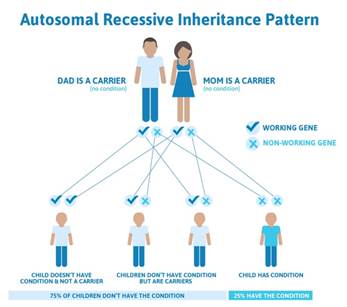What is a Carrier Screening and What Can it Tell You About Your Genetics?

Carrier screening is a type of genetic testing used to assess genetic risks to a patient/couple’s offspring that would not be evident just from personal or family history alone. Genes are the instructions within our cells that are responsible for making our bodies work properly, and humans have two copies of every gene – one inherited from each biological parent. If a gene is no longer working properly due to mutations (harmful changes) within that gene, a genetic condition may result. The genetic conditions we look for through carrier screening are called recessive disorders, where both copies of the gene have to be no longer working properly in order for an individual to actually show symptoms that condition. Some examples of common recessive genetic conditions include Cystic Fibrosis, Tay Sachs, and Sickle Cell Anemia.
Individuals who have one copy of the gene working properly and one copy with a mutation are called carriers. Because they still have one copy of the gene working that provides the body with what it needs, most carriers do not show any symptoms and there usually is no family history of the disease; most people are not aware of their carrier status. However, if a carrier has a child with someone who is also a carrier for the same condition, then there is a significant risk of having a child with that genetic condition. Each time that pairing reproduces, there are four possible outcomes for each of their offspring: a 25% chance of being completely negative (by inheriting a normal copy of the gene from each biological parent), a 50% chance to be a carrier (by an inheriting a normal copy of the gene from one biological parent and an abnormal copy from the other) and a 25% chance of being affected with the condition (by inheriting two non-working copies of the gene, one from each biological parent). Approximately 1-2% of couples/reproductive pairings are carriers for the same disease. Carrier screening also typically tests for X-linked conditions, which are conditions that only women carry. If a woman is a carrier for an X-linked genetic condition, she has a 25% chance of having an affected male with each offspring.
It is completely normal to be a carrier, and most people are carriers for at least one recessive/X-linked condition. If both members of a couple are found to be carriers of the same disease, or a female a carrier for an X-linked disease, it is possible through in vitro fertilization (IVF) to screen embryos via pre-implantation genetic testing (PGT) and determine before pregnancy is attempted whether or not each embryo is predicted to be affected with the genetic disorder. Only embryos that are not affected with the condition are transferred back in to the uterus to attempt pregnancy. This specific type of PGT is called PGT-M (Pre-implantation Genetic Testing for Monogenic diseases, formerly known as PGD). Through PGT-M, a couple can minimize the chance of conceiving a pregnancy with a child affected with the genetic disease in question. However, PGT-M requires knowing ahead of time the exact mutation(s) for which to test, so the parents must have already undergone carrier screening before it is a possible form of treatment. In addition, even if a couple chooses not to undergo IVF with PGT-M, knowing that there is an increased risk to have a child with a genetic condition ahead of time can be helpful in other ways, such as being aware that additional prenatal testing is indicated or preparing an appropriate pediatric care team to be available after the baby is born.
There are thousands of recessive/X-linked genetic conditions and it is not possible at this time to screen a patient/couple for all of them routinely. Historically, patients/couples were typically screened only for a few of the most common diseases, as each condition was an individual test and that made carrier screening expensive and labor intensive. However, thanks to the availability of a newer technology called next generation sequencing, many genetic testing laboratories now offer “expanded” carrier screening where patients/couples can be screened for 100+ recessive/X-linked conditions simultaneously at an affordable cost. RMA of NY currently offers an expanded carrier screening panel for 283 recessive/X-linked conditions through third party laboratories such as Sema4, and this testing is frequently now covered by insurance.

